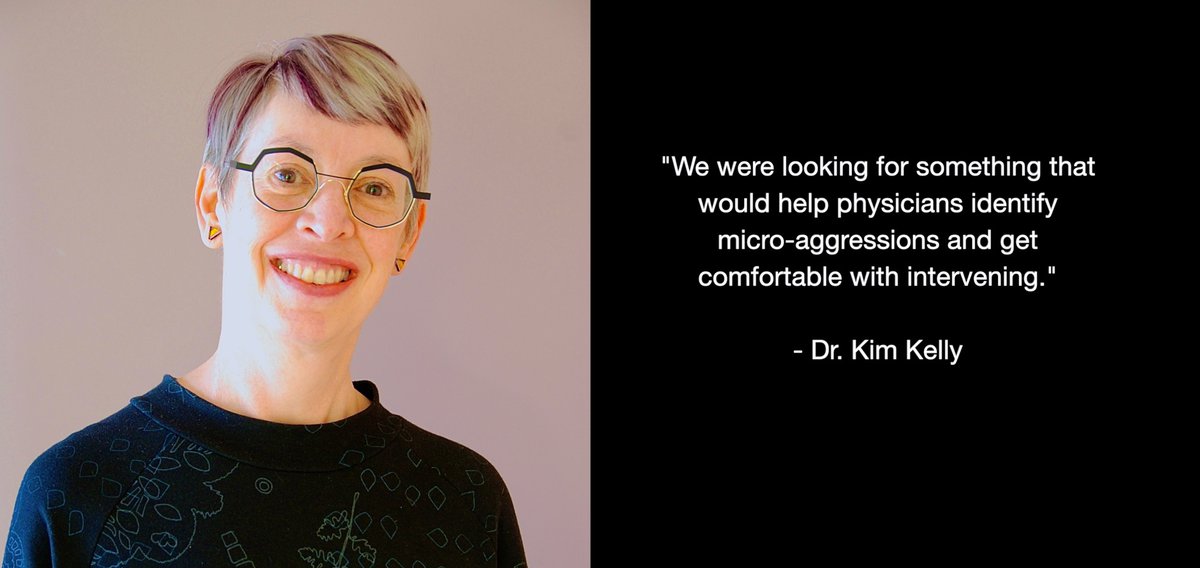The issue of racism in health care settings isn’t new – in fact, physicians have been raising concerns about systemic racism in our health care system for many years. The death of Joyce Echaquan reverberated around the world. The Atikamekw mother of seven, who died on September 28, 2020, at a hospital north of Montreal, had recorded hospital staff verbally abusing her. The death of Brian Sinclair, an Indigenous man who died waiting for care for 34 hours in a Winnipeg emergency room in 2008, was equally shocking. A much-publicized event that saw a noose taped to an operating room door that resulted in the December 2021 suspension of an Alberta surgeon further made it clear something needed to change.
Dr. Kim Kelly was working with Alberta Health Services as the Provincial Medical Representative, Wellness, Diversity & Development and was involved with the AHS Anti-Racism Advisory Group. She recalls, “I’d been hearing stories of daily encounters where physicians and non-physician staff were experiencing racism. We knew it was a systemic problem and that we had just begun to identify steps forward. I was interested in ways physicians could affect positive change at the ground level while we continued to work on systemic change.”

Dr. Kelly knew that anti-racist action was aligned with the strategic direction at AHS, the College of Physicians & Surgeons of Alberta (CPSA), and the Alberta Medical Association. She began by approaching Dr. Francois Belanger, the then-Chief Medical Officer and Vice President, Quality, of AHS to discuss the idea of creating a training course focused on addressing racism in health care settings. “Francois was very supportive, as were Dr. Sharron Spicer, the AHS Associate Chief Medical Officer, Physician Experience: Dr. Scott McLeod, the Registrar and CEO at CPSA; and Mike Gormley, the then-Executive Director at the AMA,” explains Dr. Kelly. “They recognized that this work was a priority.”
Understanding micro-aggressions
Dr. Kelly came up with the idea of focusing on micro-aggressions, which are comments and behaviours that subtly express prejudice towards people from equity-deserving groups. Those micro-aggressions may be unconscious and unintentional, but they cause real harm and contribute to discriminatory environments. She pitched the idea of creating a collaborative education module on micro-aggressions to the three organizations, and they all agreed and contributed resources, including funds, to the project.
That was in early 2022, and shortly thereafter Dr. Kelly began having conversations with subject matter experts across the province and conducted an environmental scan of what already existed. “I asked Alberta experts if there was any educational material on micro-aggressions that already existed, and what they thought would be most relevant and the best way to teach this kind of content.” Dr. Kelly spoke with about 20 people between January and June 2022, and it soon became apparent that there was nothing like the proposed course that existed specifically for physicians.
“There were some generalized micro-aggression courses available, but nothing targeting physicians.” The course content working group (CCWG) was then created in August 2022 with the subject matter experts who were interviewed and were able to volunteer their time and expertise for the next six months. The CCWG worked closely with Onlea, an Alberta company contracted to help develop the learning experience.
One of the first things that had to be decided was how to deliver the course. “We knew the best way to teach the course would be an in-person group setting, but we also realized asynchronous online learning would increase accessibility and allow for faster spread.” It was determined that an online course from one to 1.5 hours would be ideal.
The group also needed to decide whether the course should encompass all micro-aggressions or focus on race-based micro-aggressions. “The consensus from the experts was that we focus on race-based micro-aggressions as a start,” recalls Dr. Kelly. “There was enough material to cover to create a 1.5 hour course, which was the right length for what we wanted. She also consulted with Indigenous leaders, including members of the Indigenous Health Committee of the AMA and the CPSA Anti-Racism Anti-Discrimination Action Advisory Group to see if anti-Indigenous bias should be part of the first course. “I was able to present at their meetings, and it was recommended that anti-Indigenous bias have its own module, which hopefully will be the next course to be developed.”
Launched in May 2023, the Micro-Aggression Training for Physicians course is available through MyCPSA, a learning portal for all regulated members of CPSA. The course offers an introduction to anti-discrimination information and helps learners understand how to identify, understand and intervene in incidents of micro-aggressions by using real-life examples and scenarios. It took some time to achieve accreditation – one of the few delays in the project – but the course is now accredited through the College of Family Physicians of Canada MainPro+ and the Maintenance of Certification Program of the Royal College of Physicians and Surgeons of Canada.
How it works
The course takes a good/better/best approach to interventions, which encourages learners to think about how they could improve their actions. It uses a tool called “VITALS,” which teaches people to do the following:
- Validate feelings and experiences.
- Inquire to get more information and clarification.
- Take time to reflect what the person says and feels.
- Assume the need for clarity.
- Leave opportunities for follow-up conversations.
- Speak up for and support others affected by negative biases and micro-aggressions.
“We were looking for something that would help physicians identify micro-aggressions and get comfortable with intervening,” explains Dr. Kelly.
Feedback from learners
As of April 9, 2024, 1,611 learners have logged into MyCPSA and viewed the course; 673 learners have completed it. Of those who completed the course, 548 responded to the post-training survey, and more than 90% of those respondents said they would recommend the course to a colleague.
To help physicians better relate to the examples included in the course, some of the scenarios were deliberately given a local Alberta flavour. “We had feedback that says, ‘wow, this is really relevant. I've seen these situations happen in front of my eyes.’’’
Although the intent is still to develop a course specifically on anti-Indigenous bias, the Course Content Working Group felt it was important to include that topic as one of the learning scenarios within the initial course.
Overall, feedback on the course has been overwhelmingly positive. “We’re hearing that people are learning new information. They're realizing that they see micro-aggressions much more frequently than they thought,” notes Dr. Kelly. “It makes people aware that it's also happening to our patients, and most people realize they've committed micro-aggressions themselves, which is an uncomfortable feeling … but this discomfort teaches us to stop and pay more attention, to speak up when we hear something that sounds discriminatory, and hopefully to create a memory for all present of what we have witnessed or experienced so these experiences no longer get ignored.”
Physicians who have taken the course have found it relevant and useful. "We all have inherent biases that we may unintentionally express as micro-aggressions,” explains Dr. Nicole Johnson, a pediatric rheumatologist in Calgary who has taken the micro-aggression course. “I think the course is a valuable resource for all physicians. It teaches about the various types of micro-aggressions, how to recognize them and how to respond. As someone who has experienced discrimination based on my race, I also learned new ways to respond and support myself and others who experience micro-aggressions."
Dr. Kelly and the other Micro-Aggression Steering Committee members – Cameron Plitt (AMA), Sue Welke (CPSA) and Sapna Chawla (AHS) – recognize that the development and launch of the micro-aggression course has also provided important learnings on how organizations can collaborate and effectively work together. “I think we’ve shown that when you have an aligned strategic priority, you can make things happen quickly and cost-effectively.” Those learnings will help them move forward more efficiently with the next steps, which includes the development of the second module focused on anti-Indigenous bias. “All three organizations have identified addressing anti-Indigenous bias as a priority.”
What’s next?
Dr, Kelly expects that the course will continue to evolve and that there will be more interest from physicians, particularly physician leaders, who see the value of taking action to eliminate micro-aggressions occurring in health care environments.
“The EDI [equity, diversity, and inclusion] competency world is still pretty new, but I hope leaders will recognize that this course offers a way to increase their own EDI competencies, which is a necessary component of being a good leader. This type of learning is lifelong … it’s not one-and-done. This should be part of your leadership journey and part of your work as a physician. A course like this improves the care we provide to our patients, improves relationships with our colleagues, and is meaningful to practice actions that help create a healthier workplace … it’s a ripple effect that can make a tangible, powerful change.”
Watch and learn
Earlier this year, the AMA developed a short video to promote the goals and the approach of the course to help address racism in health care settings. You can view it here.
Banner image credit: Markus Kammermann, pixabay.com

